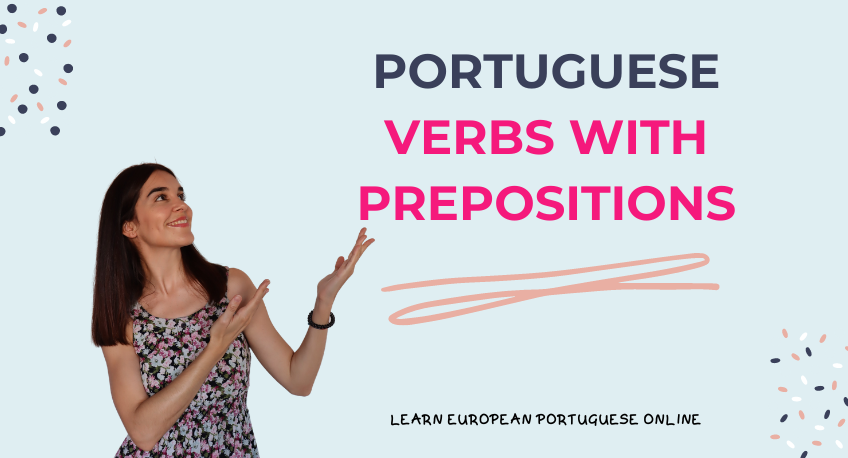Hello everyone! In today’s post I will address one of the most difficult things in Portuguese – Portuguese Verbs with Prepositions.
Do you struggle to know when to use a preposition after a certain verb? Have you been looking for answers about this?
Search no more!
In the following paragraphs you will find out all about the subject. The only not-so-good-news is that you will probably still have to learn the verbs by heart, but other than that, there is only rainbows and butterflies ahead of you!
So , shall we start? Here come the most used Portuguese verbs with prepositions! You can also watch this topic on my YouTube channel:
Most Used Portuguese Verbs with Prepositions
| Main Verbs with Prepositions | |||||||||||||
| Verbs | Prepositions | Use | Translation | ||||||||||
| Agradecer | a | When you want to thank someone – Vou agradecer ao Nuno. | Thank someone | ||||||||||
| por | When you want to thank for something – Agradeço pela (por + a) prenda. | Thank for something | |||||||||||
| Assistir | a | When you are going to be present in some show/ class etc (watch) – Ela assistiu à (a + a) aula. | Watch something/ Be present in something | ||||||||||
| Chegar | a | When you arrive somewhere – Ela chegou a casa (never em!!!). | Arrive somewhere | ||||||||||
| Comunicar | a | When you communicate something to someone – Ela comunicou ao (a + o) Pedro que a empresa ia fechar. | Communicate to someone | ||||||||||
| com | When you communicate with someone – Ele comunicou com eles. | Communicate with someone | |||||||||||
| Dar | a | When you give something to someone – Ela deu o livro ao (a + o) pai. | Give to someone | ||||||||||
| Entregar | a | When you deliver something to someone – Ele entregou a carta à (a + a) Maria. | Deliver to someone | ||||||||||
| em | When you deliver something somewhere – Ele entregou a carta em casa dela. | Deliver somewhere | |||||||||||
| Esquecer-se | de | When you forget something – Eu esqueci-me de te dizer. | Forget something | ||||||||||
| Ir | a | When you go somewhere for a brief time – Eu vou a casa e depois vou para a festa. | Go somewhere | ||||||||||
| para | When you go somewhere for a longer time – Eu vou para casa dormir. | Go somwhere for longer | |||||||||||
| Gostar | de | When you like something or someone – Ele gosta da (de + a) Maria. | Like someone or something | ||||||||||
| Lembrar-se | de | When you remember something – Eu lembro-me de ti. | Remember something or someone | ||||||||||
| Morar | em | When you want to say you live somewhere – Eu moro em Lisboa. | Live somewhere | ||||||||||
| Necessitar | de | When you need something – Eu necessito de dinheiro. | Need something | ||||||||||
| Pagar | a | When you pay something to someone – Ele pagou o livro à (a + a) Maria. | Pay to someone | ||||||||||
| por | When you pay for something you did – Eles vão pagar pelo (por + o ) crime que cometeram. | Pay for something | |||||||||||
| Precisar | de | When you need something or someone- Eu preciso de ti. | Need something | ||||||||||
| Responder | a | When you answer someone – Ela respondeu à (a + a) Simone. | Answer someone | ||||||||||
| Tratar | de | When you take care of something or someone – Ele trata disso (de + isso). | Take care of something or someone | ||||||||||
| Viver | em | The same as morar – Eu vivo em Lisboa. | Live somewhere | ||||||||||
| Voltar | de | When you come back from somewhere – Ela voltou de Erasmus | Go/come back from | ||||||||||
| a | When you go back somewhere for a brief time, to visit, etc – Ela voltou a Roma. | Go back to | |||||||||||
| para | When you go back somewhere for longer – Ela voltou para casa. | Go back to – longer periods | |||||||||||
These are some of the main verbs with prepositions in Portuguese. You can find many more, of course, but for sure the ones I just described are the ones you will encounter more in daily life.
If you read the examples I wrote, you might have found it weird that the prepositions become different when mixed with the articles. This happens because when the word that comes after the preposition asks for an article before – like “o” or “a” – then with some prepositions, you will have to mix it up and hence transform it into another word.
If you are confused, take a look at the following example:
O Manuel vai ao parque.
In this example you have the verb “ir” and you have to add the preposition “a” (look at the previous table if in doubt). BUT it does not end there. Since “parque” is masculine – “o parque” – then we will have to mix the preposition “a” and the masculine article “o”, which will leave us with “ao”.
Do you want to see another example for the verb and preposition “gostar de”? Check out one of my YouTube videos here:
Want to know how to put together the rest of the Portuguese prepositions and the articles? Take a look at the table below:
| Main Prepositions + Articles | ||||||||
| Prepositions | Articles | Result | Examples & Translation | |||||
| a | a | à | Vou à praia – I am going to the beach. | |||||
| o | ao | Vou ao parque. – I am going to the park. | ||||||
| as | às | Dou a prenda às irmãs.- I give the gift to the sisters. | ||||||
| os | aos | Dou a prenda aos irmãos. – I give the gift to the brothers (or siblings). | ||||||
| por | a | pela | Agradeço pela prenda. – I thank for the gift. | |||||
| o | pelo | Agredeço pelo abraço. – I thank for the hug. | ||||||
| as | pelas | Agradeço pelas melhoras. – I thank for the “get-well” wishes. | ||||||
| os | pelos | Agradeço pelos sapatos. – I thank for the shoes. | ||||||
| com | a | com a | Comunico com a senhora. – I communicate with the lady. | |||||
| o | com o | Comunico com o senhor. – I communicate with the man. | ||||||
| as | com as | Comunico com as pessoas. – I communicate with the people. | ||||||
| os | com os | Comunico com os homens. – I communicate with the men. | ||||||
| em | a | na | Mora na Alemanha. – She lives in Germany. | |||||
| o | no | Moro no Porto. – I live in Porto. | ||||||
| as | nas | Moro nas Bahamas. – I live in the Bahamas. | ||||||
| os | nos | Moro nos Estados Unidos. – I live in the United States. | ||||||
| de | a | da | Voltou da escola. – She/He came back from school. | |||||
| o | do | Lembrou-se do amigo. – She/ He remembered her/his friend. | ||||||
| as | das | Lembrei-me das férias. – I remembered the holidays. | ||||||
| os | dos | Voltei dos Estados Unidos. – I came back from the United States. | ||||||
| para | a | para a (prá) | Vou para a casa da minha mãe. – I go to my mother´s house. | |||||
| o | para o (pró) | Vou para o trabalho. – I go to work. | ||||||
| as | para as (prás) | Vou para as Bermudas. – I go to Bermudas. | ||||||
| os | para os (prós) | Vou para os Estados Unidos. – I go to the USA. | ||||||
Looking at the second table, you can realize that two prepositions do not mix with the article – “com” and “para”. However, even if in writing this does not officially happen, when we speak we have the tendency to say “co”, “ca”, “cos”, “cas” in the case of “com” and “prá”, “pró” “prás” and “prós” in the case of “para”.
Check out my blog post about prepositions in Portuguese if you want to know how to pronounce them.
What do you think about all of this? Have you come across some of these examples of Portuguese verbs with prepositions and did it make you confused? What about the mix between the prepositions and the articles? Do they give you a hard time? =)
Let me know in the comments below and ask if you have any questions.
Also, make sure to check out my European Portuguese Online Course where I explain this and many more topics in detail.
Thanks for being on that side and see you around for more exciting Portuguese!
Beijinhos,
Mia



Estou aqui ainda em 2021! Lendo este artigo.
Eu acho que os preposiçoes são a coisa mais difícil…….de…? aprender…? xD.
Muito obrigado pela ajuda!
/Learner of brazilian portuguese
Olá, Daniel!
Sem dúvida..acho que é assim em todas as línguas: as preposições são das coisas mais difíceis de aprender, sim 🙂
Beijinhos,
Mia
ps – este website é dedicado ao ensino de Português de Portugal 🙂 No entanto, há muitas semelhanças entre as duas línguas em termos de gramática e vocabulário. O sotaque é que é bastante diferente 🙂
Ótimo trabalho! O que tornaria ainda melhor seria adicionar algumas perguntas práticas no final.
Olá 🙂 Muito obrigada pelo feedback.
Obrigado pela ajudar
Hi Paul!
Thank you very much for your feedback.
Appreciate it a lot!
Have a great day.
Mia.
I think you made an error in the pagar/por table, but not sure if CRIME is masculine or feminine.
Thanks for your help! bjs
Hi Russ!
Thank you very much for your feedback.
You are right, there was a spelling mistake. I already corrected it and the updated version should be online =)
Crime is masculine… o crime.
Bjs
Mia.